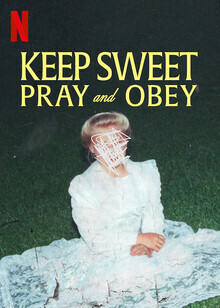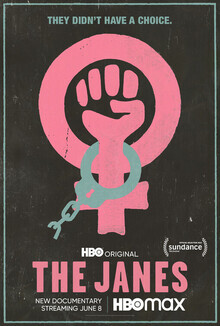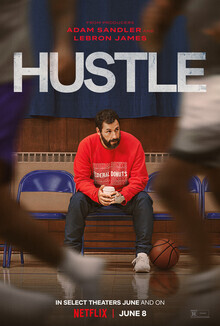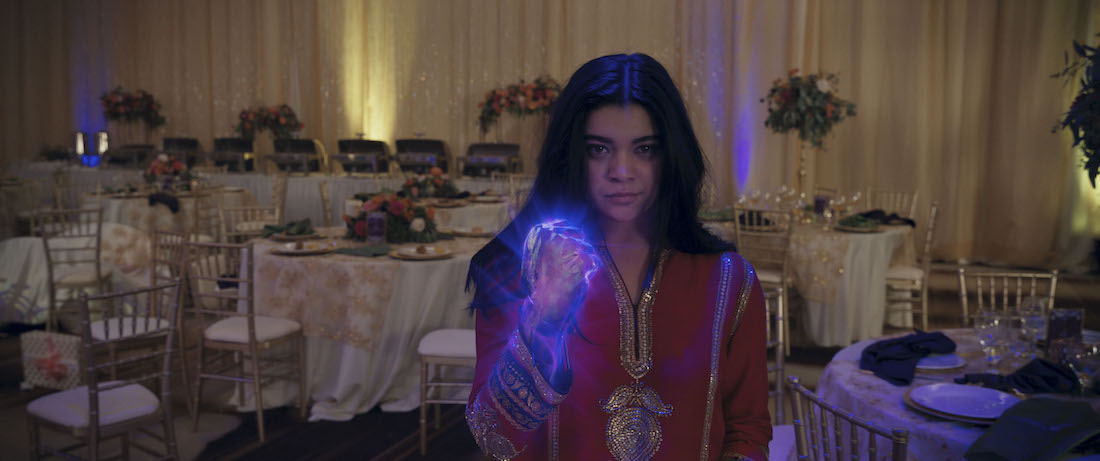
Scene: interior, day, (imagined) pitch meeting at Marvel HQ.
Executive: “We need fresh ideas, folks. Our shareholders are worried about our market value.”
Employee 1: “But our market value is estimated to be $50 billion.”
Executive: “Quiet, underling! I do not pay you to disagree with me. Think! How can we further fatten our overstuffed pockets?”
Employee 2: “So another white superhero—”
Executive: “No no, we have to make people think we care about diversity. This would be a good time, I think, to adapt Ms. Marvel.”
Employee 2: “What about people who’ve never read the comics? How do we make this story both look good and read well?”
Executive: “Speak only if you have solutions, not if you have questions.”
Employee 3, sycophantically: “You’re absolutely right. I think I can help. Why don’t we copy and paste Netflix’s ‘Never Have I Ever,’ right down to the character dynamics and plot points? We can even hire a head writer who has worked with Mindy Kaling. This will allow us to swap in Islam for Hinduism, but provide slightly improved cultural references—an emphasis on food, family friends, religion—to keep up with the Zoomers.”
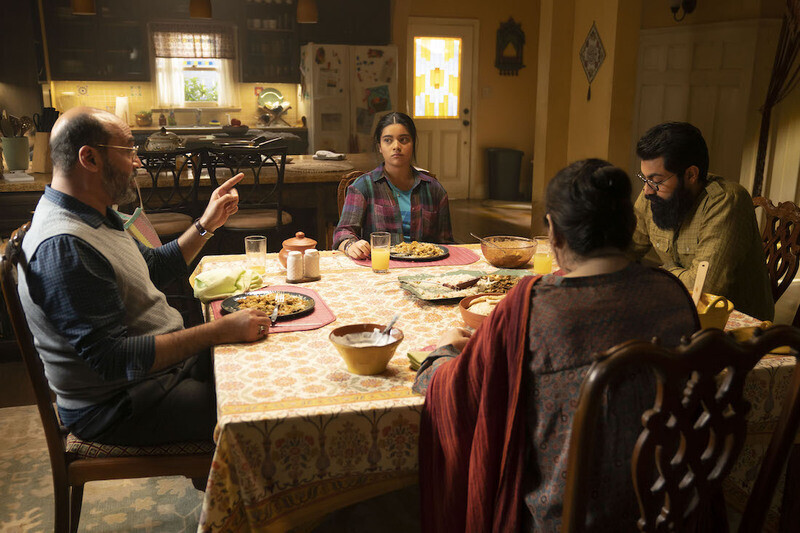
Executive, intrigued: “Hmm. Yes. Yes, continue. Can we get a Bollywood starlet? Those lissome ladies will sell Disney+ subscriptions like hotcakes!”
Employee 2: “Describing women that way is incredibly demeaning. And the optimal term is ‘Indian cinema.’ ‘Bollywood’ is a reductive term that glosses over the dozens of languages, subcultures, and traditions that—”
Executive, angry: “SILENCE, FOOL! Now, Employee 3, what were you saying?”
Employee 3: “Even if Fox and Newsmax go hard on our performative inclusion, we can sell a young Muslim woman as the newest iteration of superhero. We’ll increase revenue in Muslim-majority countries, and of course, here in America, people will feel proud to support her. It’ll allow them to think, whoa, Muslims: they’re just like us!”
Employee 2, skeptically: “Sort of like a Muslim ‘Crazy Rich Asians?’ Or like a Marvel ‘Ramy’?”
Employee 1: “Minus the quality writing, directing, editing, and soundtracks of both, I’m guessing.”
Executive, annoyed: “Obviously! Employee 3, what sort of events are happening in her life when we meet her?”
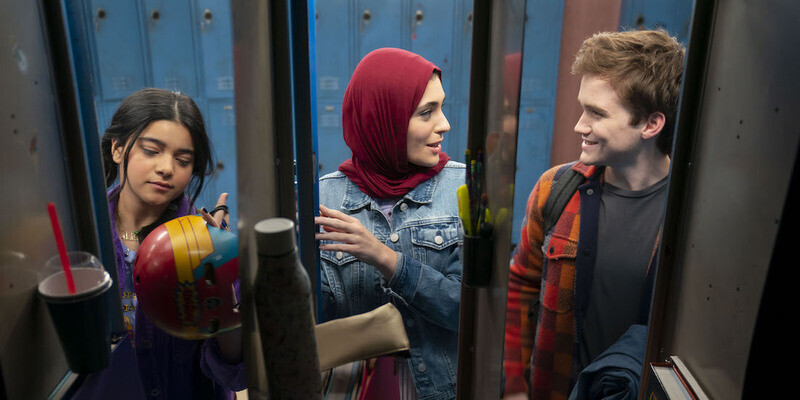
Employee 3: “No need to reinvent the wheel. Age-old tropes of rebellious teenagers, overbearing parents, the fight between self-expression and traditions—these will all do just fine as the storytelling structure. Plus, no one but comic book nerds will know whether we’ve lifted this from the comics or came up with ourselves.”
Executive, getting excited: “Yes! This will also cut down on all that pesky time writers need to write well!”
Employee 1, trying to be heard: “Could we at least simplify the format? Focus on characters, and give them dimension and depth?”
Employee 3, scoffing: “What piffle! No, instead of that, every frame of the series will be filled with hand-drawn artwork in the form of animated street murals, neon signs, all of which will be changing in order to serve as a Greek chorus for what is happening in the characters’ lives.”
Employee 2: “Won’t the artwork make each frame too cluttered? Won’t the simultaneous presence of both create a lot to take in, especially if the editing sacrifices quality for speed?”
Executive: “Who cares?”
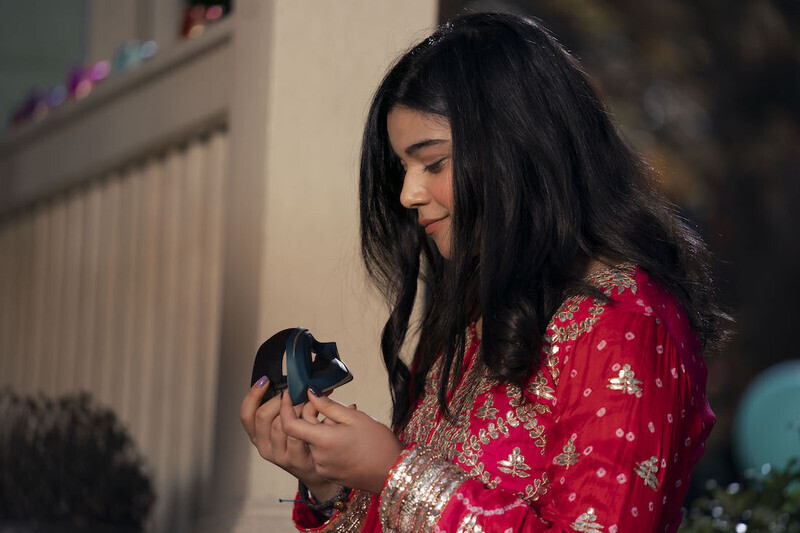
Employee 1, more forcefully: “We should at least sprinkle in a fair amount of dialogue in Hindi and Urdu, to convey authenticity, without subtitles. It should be normal for our audience to hear other languages, just as they’re spoken in households around the country.”
Employee 3, de facto running the meeting now: “Ugh, fine. Now that I think about it, that’ll help bring in the 36-55 demographic too.”
Executive: “How does this new superhero discover her powers? Does she—” Chuckles. “Does she eat a particularly phenomenal bowl of curry?”
Silence. Even Employee 3 looks appalled.
Executive, discomfited: “If you tell anyone I said that I’ll sue you for defamation. Well? How does she become a superhero?”
Employee 3: “I say we—hm, we need older viewers too, so ... let’s say her grandmother, in Pakistan, sends the family a box of old clothing and jewelry, because the superhero’s brother is getting married. (Brown people sure love their weddings, this will make for convenient plot junctures throughout the first season.) In this box is an ornate bangle. When she puts it on, in a moment of duress, it’ll infuse her with her new powers. Do you get it? Her culture is her superpower.”
Employee 2, in undertone: “Groundbreaking.”
Employee 1, sarcastically: “Yeah, damn, that’s deep.”
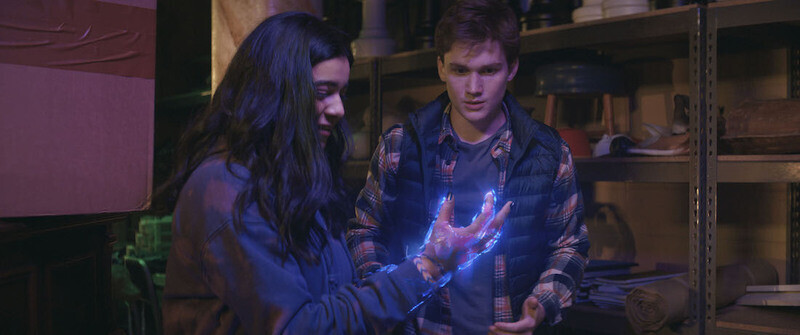
Executive, snarling: “Unlike your park employee colleagues you don’t have a union, so shut up before I fire you.”
Employee 3, on a roll now: “Just to make sure the white male comic book dweebs show up, let’s have the young lady’s best friend be a tech wizard white boy. They share a will-they, won’t-they dynamic, at least in the first two episodes, the only ones we’ll make available to critics.”
Employee 2: “She should have a friend who does not look like most people on TV. Maybe someone in a hijab.”
Executive: “I will allow that only under the stipulation that this character pauses to provide little monologues on modesty clothing, sexism in the Muslim community, and the structural racism in high school history curriculums.”

Employee 3: “Done. Also, I think it’s important for the superhero herself to be a Marvel fan. She must possess perfect, almost zealous familiarity with our IP. It would be best for her to idolize Captain Marvel, given that Danvers is a woman.”
Employee 1, hesitantly: “To what degree is the superhero a Marvel fan? If she just reads the comics that could be pretty charming, a gentler, more intriguing way to dive into the young lady’s character and inner life.”
Executive, coldly: “Is this your first day on the job? We are in the business of convincing people to define themselves using our IP. In a perfect world everyone would use Marvel, and Disney in general, as a substitute for a personality. We will reinforce this principle on the screen.”
Employee 3: “And to that end, she’s going to have artwork, posters, costumes, stickers, puppets. Every inch of her being, including her room, is about superheroes. We’ll make her a daydreaming fantasist—that always provides easy conflict fodder with parental characters who only care about report card grades.”
Employee 2, fed up: “Do you not see what we are doing? We are using a marginalized culture as a crutch to get a new demographic of viewers. There is nothing creative about making a Mindy Kaling version of a Marvel show, especially if it’s chock-full of stale parent vs. teen dynamics lifted from sitcoms decades older than the characters. We’re just trafficking in the bare minimum level of cultural engagement to feign allyship. Is that really who we want to be?”

Employee 1, earnestly: “Why don’t we take the money we’ve piled up for this effort and give it to independent voices who are pitching their non-superhero shows to Disney? Or give it to the underpaid and overworked park employees, who work punishing hours for paltry wages?”
Executive, enraged but perfectly calm: “Employees 1 and 2, thank you for attending this meeting. Effective immediately you have both been demoted to the mailroom.”
Employee 1, angry: “I don’t—”
Executive: “Don’t want to leave the conference room? Fine. Employee 3 and I are off to discuss their massive raise.”
Exec departs with Employee 3, whose back is being slapped heartily. Both are gleeful, rubbing their palms.
Employee 1, to Employee 2: “Told you we should’ve unionized.”
Two episodes were provided and screened for review. "Ms. Marvel" will air weekly on Disney+ starting June 8.
